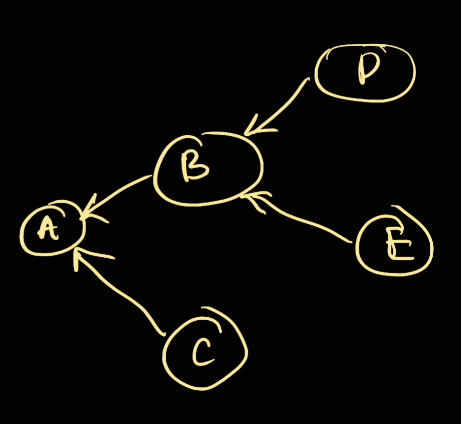Topological Sort (Kahn'S Algorithm)
Definition
Ways to identify
- When you have to do
Afirst before we doB. And then we doCor elements that dependent to each other.

For example, in this case:
Adepends onBandCBdepends onDandE
Note: for topological sort to works, the graph needs to be Directed Acyclic Graph
We can represent this graph as following:
if __name__ == "__main__":
vertices = ["A", "B", "C", "D", "E"]
dependencies = [
["B", "D"], # B dependent on D
["B", "E"], # B dependent on E
["A", "B"], # A dependent on B
["A", "C"], # A dependent on C
]
print(topological(vertices, dependencies))
Then the algorithm is as following:
- Build an Adjacency List from the
childto theparentusing hashmap- This is to navigate to the
parentonce we finished visiting thechild
- This is to navigate to the
- Build a
inDegreemap to keep track which parent still have dependencies- The ones without dependencies will be add to our queue for visiting
Note: in here we're going to use a queue for toVisit vertices. The reason why we use a queue is because we want to visit in BFS order. If using a stack, we go half DFS half BFS it doesn't make sense (because the nature of stack is exploring the top node) ^7b2308
Implementation
def topological(vertices: List[str], dependencies: List[List[int]]) -> List[int]:
dependencyMap = {
vertex: [] for vertex in vertices
}
# Since the dependencyMap is the map from child to parent
# We need this to keep track of the number of dependency the parent has
inDegree = {
vertex: 0 for vertex in vertices
}
# Build the road map from child node to parent
for parent, child in dependencies:
dependencyMap.get(child).append(parent)
inDegree[parent] += 1
# Add the non dependent vertices in a queue to start
# We set this as a queue for consistent order of BFS (if a stack it will be half-ass DFS/BFS due to stack's nature)
toVisit = deque(
[vertex for vertex in vertices if inDegree.get(vertex) == 0]
)
visited = []
# Topological sort algorithm
while toVisit:
curr = toVisit.pop()
visited.append(curr)
for parent in dependencyMap[curr]:
inDegree[parent] -= 1
if inDegree.get(parent) == 0:
toVisit.appendleft(parent)
return visited
Time Complexity: $O(V + E)$
- $V$: the number of vertex
- $E$: the number of dependencies (edges)
Space complexity: $O(V + E)$
- Because we have the map of each vertex and then the dependency map as well
Some example: